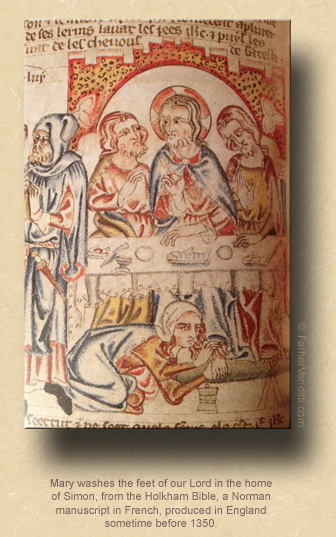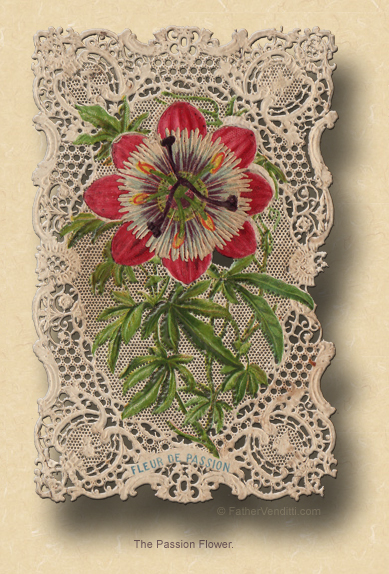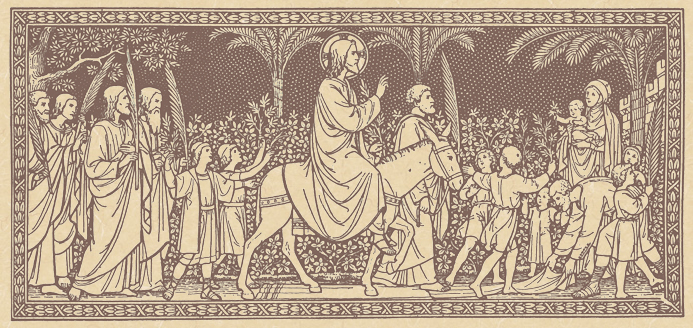Maybe We're Not as Bad as We Think We Are.
Palm Sunday of the Passion of the Lord.*
Lessons from the secondary dominica, according to the ordinary form of the Roman Rite:
• Mark 11: 1-10.
• Psalm 24 (23).
• Psalm 47 (46).
• Isaiah 50: 4-7.
• Psalm 22: 8-9, 17-20, 23-24.
• Philippians 2: 6-11.
• Mark 14: 1—15: 47.
[or, Mark 15: 1-39.]
The Second Sunday of the Passion or Palm Sunday.*
Lessons from the dominica, according to the extraordinary form of the Roman Rite:
• Matthew 21: 1-9.
• [Antiphon] Psalm 147.
• Philippians 2: 5-11.
• [Gradual] Psalm 72: 24, 1-3.
• [Tract] Psalm 21: 2-9, 18-19, 22, 24, 32.
• Matthew 26: 36-75; 27: 1-66.
FatherVenditti.com
|
 2:38 PM 3/25/2018 — When the woman anoints Our Blessed Lord with perfumed oil, seemingly out of love and devotion, we realize, as does Our Lord, that she’s really anointing Him in preparation for his burial, even though she doesn’t know this. The Jewish custom was to dress the body with perfumed oils prior to burial; but, remember that this could not be done for Jesus after His death because it was the Sabbath and late in the day; that's why Mary, Mary and Salome went to the tomb on Easter Sunday: to perform this ritual retroactively, as it were. They couldn't do it because they found the tomb empty; but, even if Our Lord had not yet risen, they couldn't have done it because it had already been done. That makes this anointing in the home of Simon the Leper significant: because it, in fact, is our Lord's burial anointing, even though He's not yet dead. But the nature of these early elements of the Passion being anticipated funeral rituals do not end with the anointing, but continues as it becomes obvious that the triumphant procession we remember today is really a funeral procession, even though no one there at the time knew it except Jesus Himself. They wanted to crown Jesus on this day and make Him King; and, He would be King. But the crown He would wear would be a crown of thorns, and His reign as a king would begin with his death. 2:38 PM 3/25/2018 — When the woman anoints Our Blessed Lord with perfumed oil, seemingly out of love and devotion, we realize, as does Our Lord, that she’s really anointing Him in preparation for his burial, even though she doesn’t know this. The Jewish custom was to dress the body with perfumed oils prior to burial; but, remember that this could not be done for Jesus after His death because it was the Sabbath and late in the day; that's why Mary, Mary and Salome went to the tomb on Easter Sunday: to perform this ritual retroactively, as it were. They couldn't do it because they found the tomb empty; but, even if Our Lord had not yet risen, they couldn't have done it because it had already been done. That makes this anointing in the home of Simon the Leper significant: because it, in fact, is our Lord's burial anointing, even though He's not yet dead. But the nature of these early elements of the Passion being anticipated funeral rituals do not end with the anointing, but continues as it becomes obvious that the triumphant procession we remember today is really a funeral procession, even though no one there at the time knew it except Jesus Himself. They wanted to crown Jesus on this day and make Him King; and, He would be King. But the crown He would wear would be a crown of thorns, and His reign as a king would begin with his death.
Palm Sunday is the only Sunday of the year where a homily is optional, the reading of the Passion being long and speaking for itself, and brevity is the order of the day; so, I would offer you just one simple—if not eclectic—thought on which to reflect: that the people lining the streets of Jerusalem, cheering for Jesus and throwing their palms in His path, were most likely the very same people who, by the end of the week, would be shouting at Pilate for His death. And how illustrative is that as an analogy for our own struggles in the interior life? We run to our Lord, His Church, His sacraments with the purest of intentions, only to find ourselves later coming up short. But that’s okay. That’s why our Lord did all of this, and why we relive these events every year.
We must begin Holy Week with this perspective: that just as Jesus’ kingship is defined by His suffering and death—just as His power and reign as a king become real in the darkest moments of His Passion which, to all intents and purposes, presents His earthly life, to the outside observer, as an abject failure—so Jesus is present for us even as we face the darkest moments of our lives, even as reliving these events so acutely reminds us of how much we may have fallen short in our duties to Christ and His Church.  We can’t help, as we relive this week the sufferings of Christ, not to think both of our own sufferings and how little we think we’ve done to merit being relieved of them. But it was through His sufferings that Jesus became a king and achieved the purpose for which He came to earth. Just so, no matter what we may be suffering through in our lives, and no matter how unworthy we may think we are of the Divine remedy that God has so wisely devised, if we unite those suffering to Christ’s, and unload our sins upon Him, then He can’t help but to raise us up with Him upon Whose mercy we have abandoned ourselves. We can’t help, as we relive this week the sufferings of Christ, not to think both of our own sufferings and how little we think we’ve done to merit being relieved of them. But it was through His sufferings that Jesus became a king and achieved the purpose for which He came to earth. Just so, no matter what we may be suffering through in our lives, and no matter how unworthy we may think we are of the Divine remedy that God has so wisely devised, if we unite those suffering to Christ’s, and unload our sins upon Him, then He can’t help but to raise us up with Him upon Whose mercy we have abandoned ourselves.
It’s not easy to believe, sometimes, when we are suffering and feel abandoned, and especially if we’ve been away from the Church and the sacraments for a long time. It’s not easy to think that it is precisely through our sufferings, and the acknowledgment of our sins, that we can receive the greatest graces and blessings, just as it wasn’t easy for Saint John and the other disciples, watching Jesus die on the cross, to believe that their glory and the glory of the Church they would establish, was just beginning; just as it wasn’t easy for the Blessed Apostle Peter to realize that his betrayal of Our Lord, as much as it may have hurt Our Lord, did nothing to derail the plan that he go on to lead the Church and be its first pope.
So, as we relive today this complex scene—the parade of cheers that ends in death—let us contemplate our hardships and sufferings, our sins and our failings, and thank God for the awareness of them, and resolve to unite them to the sufferings of Christ, and so realize, in spite of how sorry we like to feel for ourselves sometimes, how richly blessed we are by the God Who suffered for us.

* In the extraordinary form of the Roman Rite, the season of Passiontide, which began last Sunday on the First Sunday of the Passion (or simply Passion Sunday), ends today on the Second Sunday of the Passion, known as Palm Sunday. In the ordinary form, the season of Passiontide has been eliminated, and the liturgical themes of both Sundays of the Passion have been combined into a single Sunday known as Palm Sunday; in fact, in some early editions of the Missal of Bl. Paul VI, Palm Sunday is listed as Passion Sunday. The Roman Missal Third Edition attempts to cover all the bases by designating the Sunday which begins Holy Week as "Palm Sunday of the Passion of the Lord."
Please note that, in the ordinary form, all the Scripture lessons for today are constant each year except for the first Gospel for the Blessing of Palms and the Gospel lesson for the Mass, both of which change with the dominical cycle. In the extraordinary form, all the lessons are constant.
|

